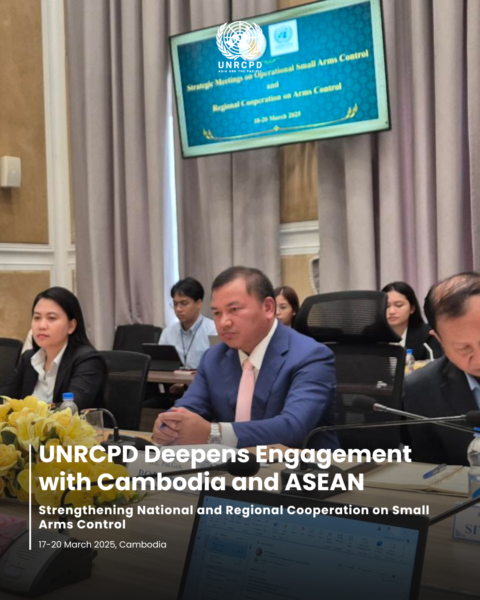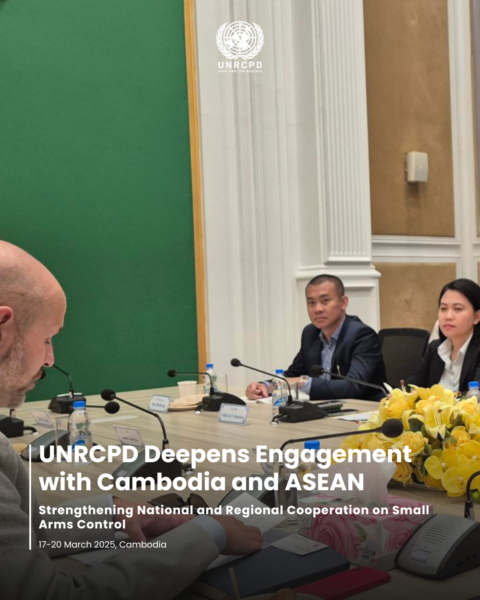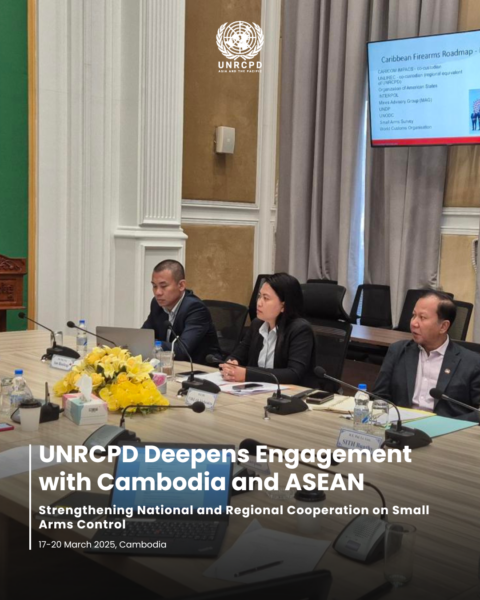Strengthening National and Regional Cooperation on Small Arms Control: UNRCPD Deepens Engagement with Cambodia and ASEAN

Advancing its regional disarmament and cooperation efforts, the United Nations Regional Centre for Peace and Disarmament in Asia and the Pacific (UNRCPD) undertook two back-to-back missions to Cambodia, reinforcing its partnership with the country’s Ministry of Interior (MoI) and expanding collaboration with the Association of Southeast Asian Nations (ASEAN).
From 18 to 20 March 2025, UNRCPD conducted a series of high-level meetings with senior officials of Cambodia’s Ministry of Interior in Phnom Penh. The meetings were chaired by senior officials of the Ministry of Interior and the ASEAN Senior Officials Meeting on Transnational Crime (SOMTC) Cambodia Secretariat, including H.E. Pol. Lt. Gen. Phath Sophanith, Secretary General and Chair of the SOMTC-Cambodia Secretariat, H.E. Pol. General Por Phak, Secretary of State and SOMTC Cambodia Leader, and Ms. Vireak Vicheakta, Deputy Secretary General and Permanent Deputy Chair of the Secretariat. Also present were senior technical officials such as Pol. Maj. Gen. Sao Bunleap, invited experts from the Mines Advisory Group (MAG), namely its Regional Director for Asia-Pacific, and from the Conventional Arms Programme of UNIDIR.
The meetings aimed to support the development of a comprehensive national strategy on small arms and light weapons (SALW), aligned with the UN Programme of Action (PoA) and its International Tracing Instrument (ITI), while also enhancing Cambodia’s leadership role in regional arms control cooperation.



Pol. General Por Phak, Secretary of State of the Ministry of Interior, Chair of the SOMTC-Cambodia Secretariat, and Ms. Vireak Vicheakta, Deputy Secretary General and Permanent Deputy Chair of the Secretariat, discussing with Mr. Deepayan Basu Ray, Director of UNRCPD
Building on a recent study tour to the Western Balkans co-organized with UNDP SEESAC, the discussions centered on practical steps to strengthen national SALW control systems. Priority areas identified included inter-agency coordination, data sharing, stockpile management, weapons disposal, and addressing new threats such as 3D-printed firearms. The Mines Advisory Group (MAG) provided in-person technical input, while the United Nations Institute for Disarmament Research (UNIDIR) joined virtually to emphasize nationally owned assessments using the MOSAIC framework.
Ms. Ida Scarpino, Political Affairs Officer at UNRCPD and Mr. Llewelyn Jones, Director for Asia-Pacific at the Mines Advisory Group, discussing with the SOMTC team, led Pol. Maj. Gen. Sao Bunleap, Deputy Director of Explosive-firearms Control Department, Ministry of Interior, strategies to improve operational small arms control practices.
A key outcome of the meetings was the agreement to co-develop a national assistance package and initiate a phased roadmap toward a regional Plan of Action under the ASEAN Declaration on Combating Arms Smuggling. In August 2023, ASEAN Member States recognized the pervasive threat posed by arms smuggling and the challenges in preventing and curbing the cross-border illicit trade in firearms and ammunition. In response, they adopted the ASEAN Declaration on Combating Arms Smuggling as a collective commitment to intensify regional cooperation in addressing these growing threats. Cambodia, serving as the lead shepherd of the Declaration, invited UNRCPD to present its proposals during the open session of the 7th Senior Officials Meeting on Transnational Crime (SOMTC) Working Group on Arms Smuggling—marking a milestone in the Centre’s formal engagement within the ASEAN SOMTC cooperation framework.

Opening session of the 7th ASEAN SOMTC working group on arms smuggling, from right to left clockwise, Mr. Fred Lubang, Programme Manager, NISEA, Mr. Deepayan Basu Ray, Director, UNRCPD, H.E. Pol. General Por Phak, Secretary of State of the Ministry of Interior, Chair of the SOMTC-Cambodia Secretariat, Ms. Vireak Vicheakta, Deputy Secretary General and Permanent Deputy Chair of the Secretariat, Pol. Maj. Gen. Sao Bunleap, Deputy Director of Explosive-firearms Control Department, Ida Scarpino, Political Affairs Officer, UNRCPD.
The meeting, held on 8 April 2025 and hosted in Sihanoukville by the Ministry of Interior of Cambodia, brought together delegations from eight ASEAN Member States, Timor-Leste, the ASEAN Secretariat, and Nonviolence International Southeast Asia (NISEA), which participated as the sole civil society organization.
Mr. Deepayan Basu Ray, Director, UNRCPD, presenting the Centre’s work and strategy to support the ASEAN Declaration to Combat Arms Smuggling during the open session of 7th ASEAN SOMTC working group on arms smuggling.
UNRCPD took part in the open session, presenting its mandate and ongoing work in the region to assist states in implementing multilateral frameworks aimed at curbing the illicit proliferation of arms. The session also provided an opportunity for the Centre to highlight its collaboration with the Ministry of Interior of Cambodia and share proposals discussed for the development of a regional Plan of Action to implement the ASEAN Declaration on Combating Arms Smuggling.
Drawing on global best practices and lessons learned from regional roadmaps in the Western Balkans, the Caribbean, and Central America—where the UN Office for Disarmament Affairs has supported similar initiatives—UNRCPD emphasized key success factors for regional cooperation. These included the importance of national ownership, effective multi-agency coordination, baseline assessments, multi-donor engagement, and the active participation of civil society. The Centre also outlined how it can provide both technical and financial assistance, and mobilize broader support through partnerships with specialized NGOs and other UN entities.
These missions also reaffirmed UNRCPD’s role as a trusted partner for dialogue, technical support, and inter-agency cooperation in Asia and the Pacific. As the Centre continues to support Cambodia and the broader ASEAN region, it remains committed to advancing inclusive, evidence-based, and sustainable disarmament practices rooted in regional ownership and aligned with global arms control frameworks.
Both missions have been conducted as part of UNODA’s global project, funded by the European Union (EU Council Decision 2022/65), [1] for the purpose of supporting States in the full and effective implementation of the UN Programme of Action on SALW and its International Tracing Instruments.
For further information, please contact Ida Scarpino, Political Affairs Officer, at the United Nations Regional Centre for Peace and Disarmament in Asia and the Pacific, via email at ida.scarpino@un.org.
[1] https://eur-lex.europa.eu/eli/dec/2022/1965/oj

